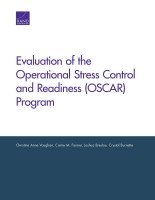| 来源类型 | Research Reports
|
| 规范类型 | 报告
|
| ISBN | 9780833090164
|
| 来源ID | RR-562-OSD
|
| Evaluation of the Operational Stress Control and Readiness (OSCAR) Program |
| Christine Anne Vaughan; Carrie M. Farmer; Joshua Breslau; Crystal Burnette
|
| 发表日期 | 2015
|
| 出版年 | 2015
|
| 页码 | 150
|
| 语种 | 英语
|
| 结论 |
OSCAR Increases the Use of Support for Stress Problems, but There Was No Evidence of an Impact on Marines' Mental Health Status or Any Other Outcomes - The effects of OSCAR on support-seeking behavior persisted after adjustment for baseline characteristics and deployment experiences.
- This evaluation did not find evidence that OSCAR had an impact on mental health stigma or mental health outcomes.
OSCAR Is Perceived as a Useful Tool for Combat and Operational Stress Control - Battalion commanders valued OSCAR because it aligns well with their understanding of their roles as leaders.
- Officers and enlisted Marines voiced support for the principles that underlie OSCAR — in particular, the emphasis on peer support and avoidance of medical intervention through early identification and management of stress and mental health problems.
Potential Problems Were Identified - Many Marines complained of having received too much training on combat and operational stress.
- Some Marines suggested that annual trainings, regardless of deployment, would help to keep Marines in a state of readiness for future combat deployments.
- Significant variation in outcomes across OSCAR-trained battalions might indicate that OSCAR was not implemented consistently across the battalions.
|
| 摘要 |
- Review and streamline Marine Corps combat and operational stress–control training programs.
- Identify and reduce duplication of effort in combat and operational stress–control trainings.
- Enhance the use of a common language for concepts related to combat and operational stress control across combat and operational stress–control training programs.
- Ensure that combat and operational stress–control program trainers have combat experience.
- Identify potential changes to the design and implementation of combat and operational stress–control training.
- Consider providing combat and operational stress–control training to all Marines in the chain of command, down to the level of squad leader.
- Integrate combat and operational stress–control training into the deployment cycle and maintain it regularly among nondeploying troops.
- Pilot-test changes to combat and operational stress–control training.
- Expand the evidence base regarding operational stress management.
- Examine patterns of support-seeking and help-seeking in more detail.
|
| 主题 | Health Care Program Evaluation
; Mental Health and Illness
; Military Health and Health Care
; Posttraumatic Stress Disorder
; United States Marine Corps
|
| URL | https://www.rand.org/pubs/research_reports/RR562.html
|
| 来源智库 | RAND Corporation (United States)
|
| 资源类型 | 智库出版物
|
| 条目标识符 | http://119.78.100.153/handle/2XGU8XDN/108114
|
推荐引用方式
GB/T 7714 |
Christine Anne Vaughan,Carrie M. Farmer,Joshua Breslau,et al. Evaluation of the Operational Stress Control and Readiness (OSCAR) Program. 2015.
|
|
文件名:
|
x1495316368106.jpg
|
|
格式:
|
JPEG
|

|
文件名:
|
RAND_RR562.pdf
|
|
格式:
|
Adobe PDF
|
除非特别说明,本系统中所有内容都受版权保护,并保留所有权利。